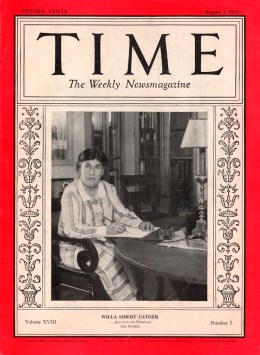
ISSUE DATE: Aug. 3, 1931
THE BUZZ:
But quotation, often unjust, cannot do Willa Cather justice. Her manner of writing has little in common with her noisy day. Characterized by an English critic as “that rara avis, an autochthonous American author,” she is most conveniently classified by negatives. Says the same critic: “The King Charles’s head of psychoanalysis and experiment in genre does not keep continually turning up in her books as they do [sic] in those rather Mr. Dick-like compositions of Mr. Sherwood Anderson for instance.” Unlike Sinclair Lewis, she does not bite her country’s hand; unlike Edith Wharton (whose example influenced her early work) she casts no nostalgic backward glances toward Europe; unlike Ernest Hemingway, she carries no gnawing fox in her devoted bosom. Her simple, colloquial language obeys the canon of good prose (she rereads Pilgrim’s Progress annually), and in that is unremarkable. But she has an individual quality, positive attributes which hide their light under a phrase or even a paragraph, but which shine through her pages like moonlight under water.
Read the full story here
